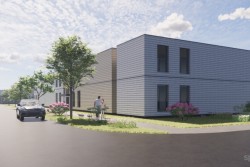Councils are also looking at repurposing spaces above shops to house refugees who have spent months in hotels.
Councils across Wales are working hastily to build modular homes and other temporary accommodation including utilising spaces above shops in a rush to house Ukrainian refugees as the Welsh Government prepares to close its welcome centres.
Around 1,700 refugees who fled Vladamir Putin's war remain housed in welcome centres (mainly hotels) in Wales established as part of the Welsh Government's 'super sponsor' scheme. The Welsh Government is now moving to close these welcome centres in a matter of weeks at a time when appetite of sponsors to take in refugees remains significantly down on this time last year due to cost of living.
The Welsh Government said it is working with councils to encourage them to make bids for modular homes similar to those already planned for Llantwit Major in the Vale of Glamorgan. Councils can use their permitted development rights to commence work without planning permission.
Earlier this month we visited a welcome centre where refugee families told us they feared for their futures having been told they all need to leave by April 1. Other welcome centres are closing before April. The refugees at the hotel spoke of private landlords not wanting to take them because of worries over regular income to afford rent.
So far 1,300 refugees have moved out of welcome centres in Wales, leaving 1,700 still needing a home. Minister for Social Justice Jane Hutt told WalesOnline the Welsh Government is heading for a "critical" and "intensive few weeks" to ensure every Ukrainian is rehomed.
"Before January we had funding from the UK Government in the form of a tariff for local authorities but unfortunately in January that was cut in half which has not been helpful at all," Ms Hutt said. "Local authorities used that money to appoint teams of people to help the resettlement and move on process.
"This is quite a challenge because there are many people with housing needs in Wales and there are also challenges in terms of rising rents in the private rental sector. We've been consistently calling on the UK Government for a rise in housing allowance.
"With our Transitional Accommodation Capital Programme councils can apply for funding for modular housing, housing provided temporarily, opening of empty properties."
Just short of a year since the first of 27 welcome centres opened, only 11 welcome centres have so far been able to stop hosting refugees and many refugees have lived there for more than eight months. They were initially planned to be temporary services that would last for a maximum of three months.
Asked if she felt Wales had accepted more refugees than it could accommodate properly, Ms Hutt said: "You never know [what to expect] when you set out on a path of humanitarian response and absolutely commit to response to disaster. Yes, it's been hugely challenging, but that doesn't mean to say you don't keep working to rise to those challenges. A year ago when we saw what was happening [in Ukraine] we said we thought we could manage to support 1,000 Ukrainians. We said that with the experience we had from taking refugees from Syria and Afghanistan. But [this time] we just kept saying 'yes' and we feel now many, many Ukrainians are here and settled and are part of Wales; they are working, learning English, the children are going to school. Nobody wants to stay in a hotel or an initial welcome centre and we really thought in the early days that it would just be for a few weeks. The real focus at the moment is helping Ukrainians who are here to move on into more settled accommodation and we can only do that with the help of local authorities and more hosts."
Ms Hutt predicts that new accommodation including modular homes will soon become "very quickly available". "We want to assure Ukrainians here that we will see them through this period," she continued. "I'm sure they will recognise that you can't live in a hotel forever. This transitional accommodation is going to be very important and will be top class."
Ms Hutt thanked sponsors still housing Ukrainians but admitted the number of willing sponsors had "come right down", which she partly puts down to the UK Government refusing to increase monthly "thank you" payments. Nationally these payments to sponsors remain at £350 which sponsors generally say is nowhere near enough. Some councils have taken it upon themselves to raise that figure to £500 monthly for each host. The Welsh Government continues to appeal for people to come forward, Ms Hutt said.
Source: www.walesonline.co.uk









